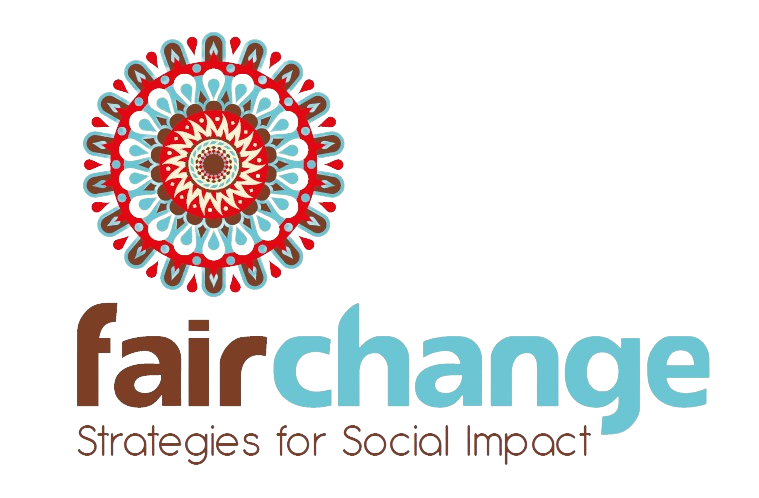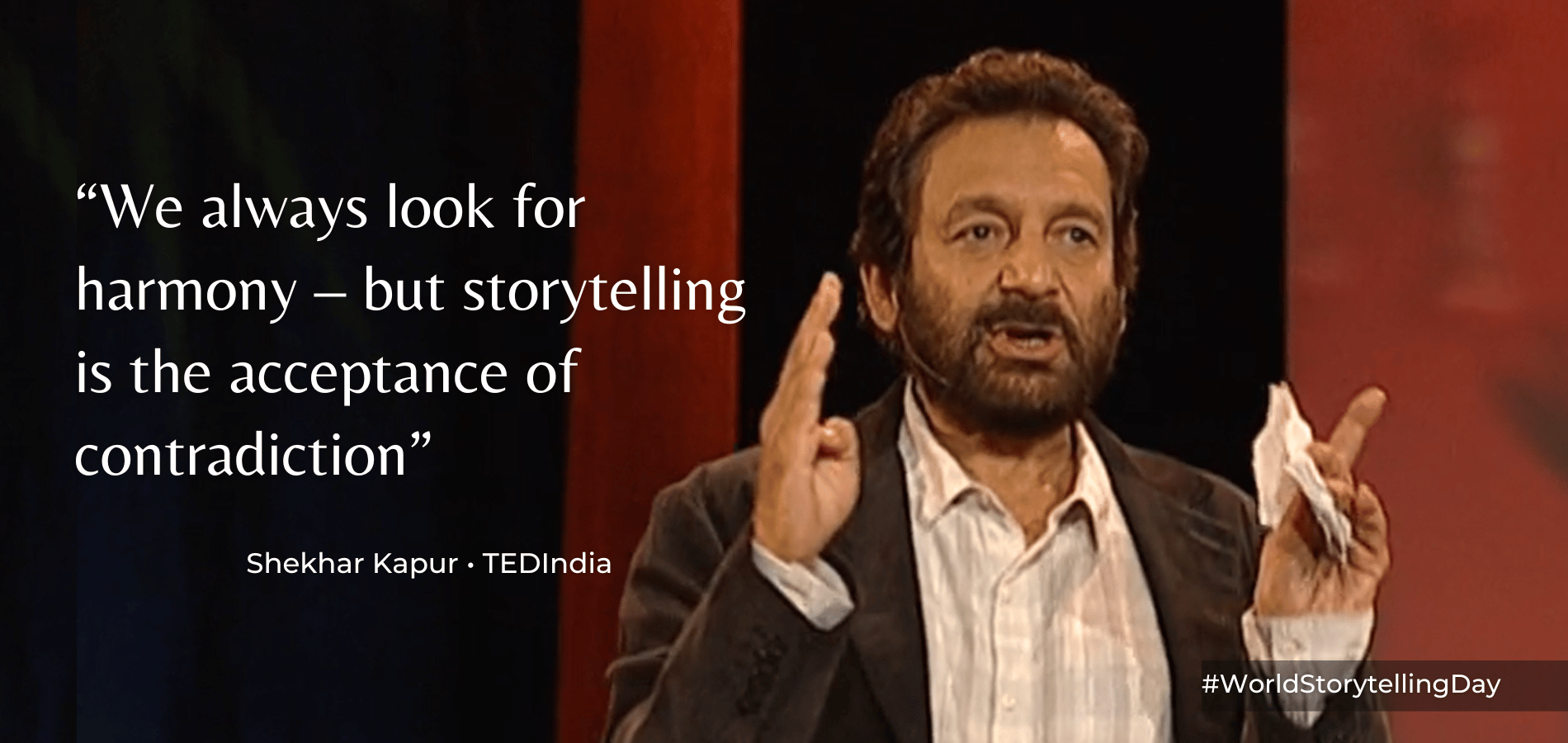Happy Storytelling Day! As a tribute to storytellers across the globe, here’s a closer look at “We are the stories we tell ourselves” by Bollywood/Hollywood director Shekhar Kapur (TEDIndia 2009). It’s not just one of the most fascinating TED Talks I know. It also holds some significant insights for storytellers in business.
Every year, during the March equinox when spring arrives in the Northern hemisphere and autumn in the South, World Storytelling Day is celebrated. From Sweden to Mexico, from Mali to Singapore, narrators and audiences gather to honour the art of oral storytelling.
Storytelling is as old as humankind and has been used by individuals and communities everywhere to pass on traditions, transmit information, educate children, understand the spiritual and the physical world surrounding us, and as an art form to move audiences. More recently, storytelling has become widely used in another area: that of businesses and marketing. Purpose-driven enterprises everywhere look to tell authentic stories that spotlight positive impact.
Master storyteller Kapur
As a tribute to storytellers across the globe, here’s one of the most fascinating TED Talks I think you should watch: “We are the stories we tell ourselves” by Bollywood/Hollywood director Shekhar Kapur (TEDIndia 2009). Kapur´s latest movie, What’s Love Got to Do With It? has recently hit the screens.
In his TED Talk, the master storyteller shares clips from an earlier film, Elizabeth (1998). The captivating scenes from his critically acclaimed biographical drama that earned seven Oscar nominations and features Cate Blanchett in her breakthrough role, illustrate his point.
We prepare too much
As businesses and professional storytellers we learn that we should carefully craft our narrative. Our message has to be clear, neatly structured and unambiguous if we want to capture the hearts and minds of our audience.
Not if you ask Kapur. His advice: Tear up your script, enter in panic, loose yourself in chaos and pray to the Universe that some truth and clarity will come. That’s how he shows up as a director before his startled film crew at 7am in the morning, he tells his TED viewers: “Get rid of your mind. We prepare too much, we think too much. Knowledge becomes a weight upon wisdom.”
The best stories are multi-leveled, he continues. It is not necessary that these levels agree with each other. Actually, it’s wonderful when they don’t.
Look for contradiction, not harmony
And this is precisely what happens if an Indian director brings the colorful magic of his home country and the swirling exuberance of Bollywood movie making to the serious majesty of England’s 16th century Queen. Scenes from the film show how psychological, political, spiritual and mythological plots mingle to tell this age-old story from a new, intriguing perspective.
The camera angles, lighting, architecture and landscapes surrounding the Queen and her court, all combine to highlight the conflicting moralities of good and evil, the divine and the mortal, that inspire the narrative.
“We always look for harmony but actually, storytelling is the acceptance of contradiction – not the resolution of contradiction,” Kapur concludes.
Takeaways for business storytellers
Of course, as storytellers in business we don’t have the Hollywood-size budgets, the premium star cast nor the two-hour time slots to get our narratives across. Still, Kapur’s TED Talk holds some useful takeaways for us.
Here are five lessons for storytellers that are inspired by his insights:
- Defining the purpose of your story, with the intended message and audiences in mind, is always an important starting point. But dare to get away from your plan if opportunities for a new plot or a new twist to your story unexpectedly arise. If you let loose, you’ll be surprised by the captivating narratives you’ll come across!
- Look beyond the obvious. Approach your story topic with questions, not conclusions. Try to dig deeper and surface facts, characters, events, that lay hidden at first glance. This will enrich your story and set it apart from the usual narratives that only scratch the surface.
- Step out of your own shoes and ask unexpected questions. What would a psychologist ask if she would tell the story? What would a politician what to know? A priest? A film director? Someone from a faraway culture? Unexpected perspectives add an extra flavour to your story.
- Intertwine universal themes of conflict and transformation with your storyline. How Good conquers Evil, Desperation makes way for Euphoria, Friendship wins over Loneliness, or Losers turn into Winners – to mention just a few examples. Who hasn’t faced similar struggles? Because it feels familiar, your audience will be moved by this deeper layer of meaning.
- Use carefully chosen physical characteristics of the environment to reinforce your message. Light, weather conditions, colors and texture of a background, landscapes, what’s present in a room (and even what isn’t) – they all combine to add meaning to the narrative. When shooting your video, bring in these elements to visually enhance the story; when writing copy, subtly include them in your text.
Winning the hearts of our audiences
Masterful storytelling is an art, not a science. There is no formula to develop a story guaranteed to captivate our viewers or readers. The beauty of Shekhar’s example lies in his out-of-the-ordinary approach to creating powerful narratives. If we embrace his insights, we may not win the next Oscar, but we’ll increase the chances of winning the hearts and minds of our audiences.
March 20 is World Storytelling Day. Stay updated on awareness days, green and social events, and religious celebrations from all major religions and download the FairChange People & Planet Calendar (your FREE guide to well over 365 opportunities to make a positive impact!).
Resources
What’s Love Got to Do With It? (film, 2022) – Wikipedia
Elizabeth (film, 1998) – Wikipedia
About Shekhar Kapur- Britannica
Did you like this blog post? Subscribe to Purpose & Impact Now and you’ll be the first to receive new articles, tools and tips to do business with a higher purpose and grow your positive impact. Yes! Put me on the mailing list.

